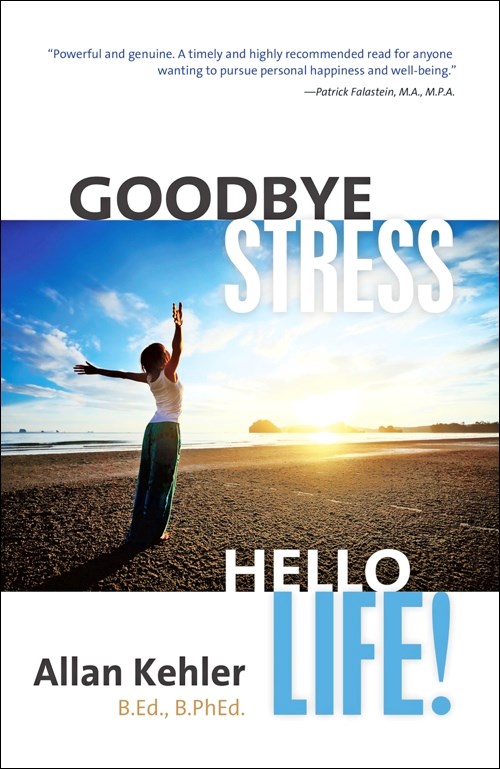By Allan Kehler
Published by Your Nickel’s Worth Publishing
$15.95 ISBN 978-1-927756-53-9
Stress: every person deals with some amount of it. Some turn to vices (drugs, alcoholism, over-eating). Some become angry, fearful or depressed. Many become physically ill and fortunate others view stress as a challenge to be dealt with in positive ways (changing routines, practicing mindfulness, exercising). If stress is threatening to sink you, reading Saskatonian Allan Kehler's latest book could be a swell start to swimming out of it.
Kehler is a public presenter with a wealth of experience, both professional (addictions counsellor, clinical case manager and college instructor) and personal (mental health and addiction issues) that fuel his authority on stress and living a healthier life. The blurb on Goodbye Stress, Hello Life! is a strong motivator for any potential readers. “[Kehler] empowers you to take an honest look at what lies beneath your stressors, and provides the tools to heal through a holistic approach. You will be inspired to stop existing and start living ..."
What I appreciate most about this book is the great and diverse analogies Kehler employs. He talks about the body's "sympathetic system" acting like a gas pedal during a stressful event. This is the "fight or flight" response. In times of stress, we tend to either jam the gas (flight) or hit the brake (fight). Doing nothing is another option. Among balanced individuals, a natural ebb and flow exists between these reactions, but one can become "stuck" on either response, and this is where addictions and other negative choices may kick in.
Another analogy concerns the teachings of a turtle. The turtle "teaches us the importance of going within" and, in this fast-paced and instant-gratification society, "to slow down." When we truly look inside ourselves, Kehler maintains we "will find all of [our] answers," and slowing allows us to be silent and listen to our "gut" for "strong and accurate information."
I took a mindfulness class recently, and the instructor spoke of people having two brains — the gut brain and the intellectual brain — and said the deepest thinkers think very little.
Instead, they go still and wait for the "gut feeling," which is a much more reliable brain. Kehler's text is peppered with interesting statistics. "One study revealed that 75 to 90 per cent of all doctors' office visits are for stress-related ailments and complaints (Goldberg, 2007)." Learning to deal effectively with stress could be beneficial at so many levels, from reducing doctor's visits for ulcers and fatigue to extending lives that ended too early from stress-influenced diseases like cancer, diabetes and stroke.
The author discusses remedies for workplace stress like time management and progressive muscle relaxation, the importance of not only talking about one's pain but also "feel[ing] your feelings and the lessons we can learn from children. He says "A sense of child-like wonder manifests itself when you build a tree fort or engage in a game of tag."
Again, I find myself agreeing. Only yesterday, I went skating and even tried a few spins.
This book is available at your local bookstore or from www.skbooks.com.



